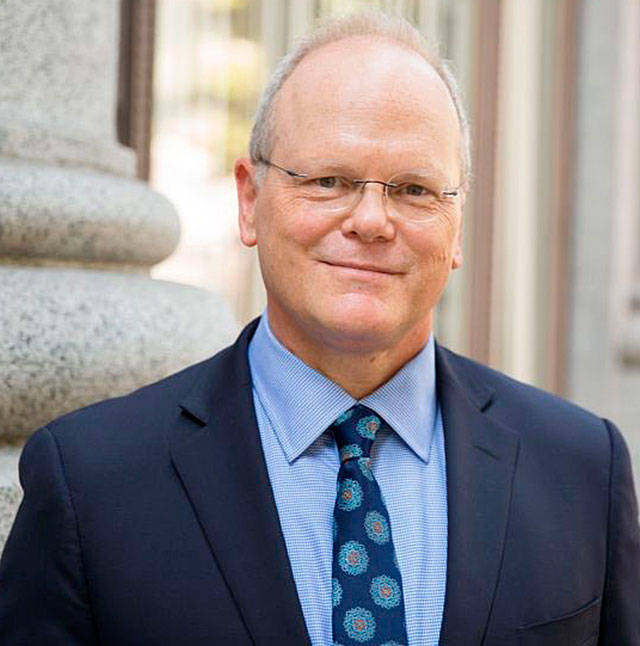King County Prosecutor Dan Satterberg wants to get drug addicts into treatment centers rather than prison cells so he supports a state proposal for a payroll tax on King County businesses with employees who make more than $150,000 per year.
“It will raise about $130 million a year and that might help us to build more of these facilities and a place where families can get somebody into,” said Satterberg, during a Feb. 6 speech at the Kent Chamber of Commerce luncheon at the John Volken Academy, a long-term addiction treatment center on Central Avenue North.
House Bill 2907, sponsored by Rep. Nicole Macri, D-Seattle, would impose a head tax of up to .02 percent that an employer must pay for each employee making more than $150,000 annually. It would cost a business about $300 for the head tax if an employee is paid $150,000.
“This is supported by the business community because they’ve invested a lot in our region and they realize there is not enough support and treatment for homeless so we need to do something,” Satterberg said.
The measure would support four primary areas:
• Affordable housing
• Investments to tackle homelessness
• Support for behavioral health and substance use disorder
• Upstream public safety and diversion solutions
Satterberg’s statement about the payroll tax support by businesses led to a quick response from Carmen Goers, chair of the Chamber’s Government Affairs Committee, and emcee of the event.
“The Kent Chamber of Commerce and South Sound Chambers are in opposition of that bill because we want more information about the exemptions,” Goers said.
Small businesses with 50 employees or fewer would be exempt as long as at least half of the employees make less than $150,000 per year. Others that would be exempted include grocery stores, motor vehicle fuel businesses as well as government entities.
Amazon, Costco, Microsoft, Alaska Airlines, Expedia and Starbucks have expressed support for the concept behind the bill, according to the Seattle Times.
Kent Mayor Dana Ralph didn’t attend the chamber luncheon, but she said during her report at the Feb. 4 City Council meeting that she didn’t like how no cities other than Seattle knew about the proposal. That’s why she joined Auburn Mayor Nancy Backus in Olympia to testify about the bill Feb. 4 in front of the House Committee on Finance.
“Our biggest concern is none of the cities outside of Seattle were invited to the conversation in putting that piece of legislation together,” Ralph said. “There are 38 other cities in King County, so that’s pretty disproportional when you have one city involved and not the rest. So that was our ask, that they include us in that conversation.”
Ralph also told the committee the bill should provide a more defined plan about how revenue will be collected and spent in each region in the county as well as what type of services and projects are to be included.
King County Executive Dow Constantine and Seattle Mayor Jenny Durkan sent out a press release in late January in support of the measure. The proposal includes about 43% of the revenue going to the city of Seattle to spend on affordable housing, public safety and behavioral health.
Satterberg emphasized at the Chamber meeting that he favors any proposal that gets more people into treatment.
“We should reserve that prison cell for the person who is the violent drug dealer, the for-profit drug dealer, the importer of fentanyl,” Satterberg said. “And if someone has a drug addiction, we should treat it like a disease and treat them like they are a member of our family.”
Earlier during his speech, Satterberg shared how he had a younger sister who was a drug addict.
“People who become addicted to drugs, they lose their way and they burn their bridges,” he said. “This happened in my family. My younger sister was a heroin addict and for 15 years she used heroin every single day. I could no longer have a connection with her because she would lie and cheat and steal. She became isolated and surrounded herself with other people who had to seek drugs every day.
“If you are a heroin user, you need to use it about every eight hours or you will begin to go through what has been described to me as the most painful flu ever, nausea and sweating and withdrawal symptoms are something that once people go through it once they never want to do it again and would rather use than experience that.”
Satterberg said that’s why addicts need support at treatment centers.
“It’s all about making that connection and convincing people that they are worth saving,” he said. “That’s the first thing you have to do with someone who is in the throes of substance abuse disorder is to tell them that we love you, see promise in you and you can be more than this and we want to help you get there.”
Talk to us
Please share your story tips by emailing editor@kentreporter.com.
To share your opinion for publication, submit a letter through our website https://www.kentreporter.com/submit-letter/. Include your name, address and daytime phone number. (We’ll only publish your name and hometown.) Please keep letters to 300 words or less.

